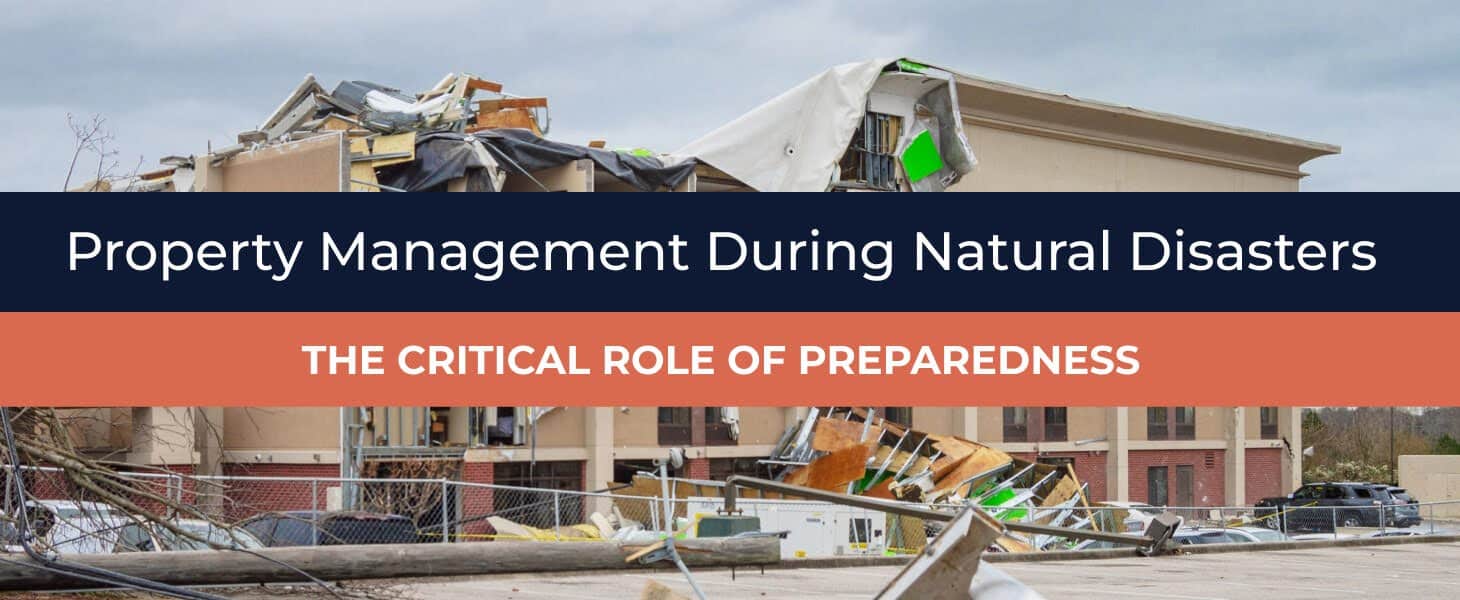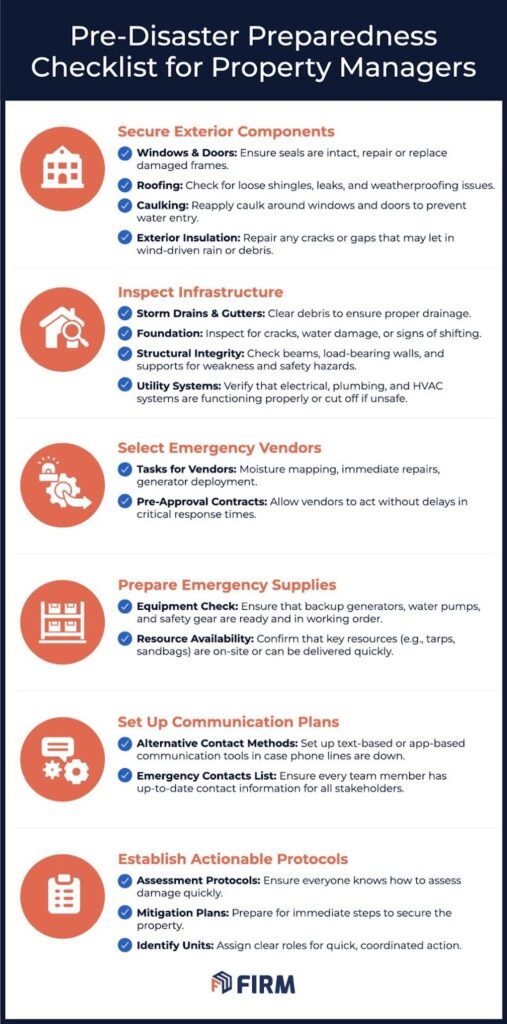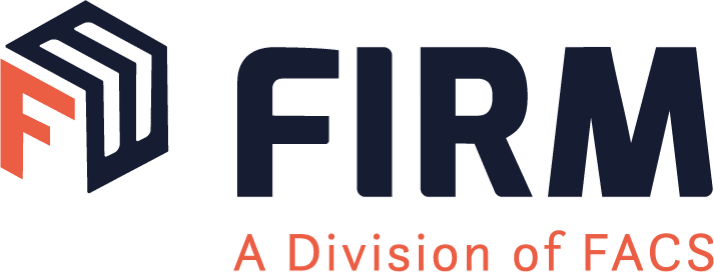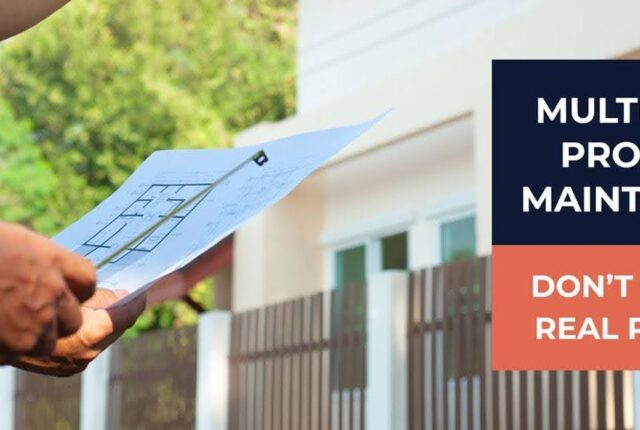
The Critical Role of Preparedness in Property Management During Natural Disasters
Disaster can strike fast, often without warning, and their impact can be overwhelming. Natural disasters do more than damage buildings, they test the readiness of your management team. Property managers must balance the safety of their people while protecting assets and restoring operations as quickly as possible.
Preparation is crucial. A well-coordinated emergency plan can spell the difference between a controlled response and a costly, chaotic scramble. Knowing who is responsible for what, having resources ready, and maintaining clear communication lines are essential when disaster strikes.
That is why FACS developed the FIRM (FACS Incident Response Management) concept. FIRM clients enjoy the structure and support they sorely need to execute a calculated response when it matters most.

Establish a Solid Emergency Response Framework
Disaster response is complex, and preparation begins with developing a suitable plan for collaboration. An emergency response framework not only designates specific responsibilities but ensures each team — including on-site operations, facilities, and emergency vendors — knows how to act quickly and efficiently.
Coordination Among Teams
Each of your teams plays a special role in your property’s response to natural disasters. The operations team serves as the front line. They are responsible for assessing damages and taking the first steps toward resolution. They’re also tasked with identifying affected areas and labeling units — impacted, occupied, or unoccupied — so everyone has a clear sense of where to focus their efforts. By ensuring the operations team can make rapid assessments, property managers can quickly categorize damages and prevent any team overlap or confusion in the initial stages.
Meanwhile, facilities staff and emergency vendors work in tandem to mitigate the damage and restore the property. This alignment between on-site teams and emergency vendors is essential to maintain a swift, efficient response that minimizes property losses and business disruptions. As emergency vendors begin to execute their role, they rely on accurate, up-to-date information from the operations team. At the same time, vendors can prioritize services based on the property’s needs, creating a clear chain of action that allows each team to do what they do best.
Actionable Protocols for Each Role
Emergency plans must go beyond general responsibilities. Each role should be outlined with specific protocols, from checking structural integrity and surveying the function of utilities to determining which units remain usable and which require immediate repair. A cohesive emergency response framework not only establishes each team member’s role; it provides actionable steps each team can follow. This way, teams can act on pre-determined duties without needing to figure out what to do next in the midst of chaos. Properties that pre-plan and practice that plan are better prepared to withstand whatever nature throws at them.
Proactive Maintenance and Pre-Approval of Emergency Actions
Preparedness plans also do something that often gets missed. A properly designed strategy makes sure the property is ready before disaster strikes. Proactive maintenance is often the single most effective way to protect a property from the worst effects of natural disasters. Actions such as checking the integrity of windows, roofing, caulking, and exterior elements — then repairing or replacing components as needed — can help your property stand up to severe weather. Preparedness activities deliver a huge return on investment.
Routine Infrastructure Checks
Routine inspections and maintenance of critical exterior components are essential. Small issues like loose caulking, damaged roofing, or compromised exterior envelope issues can become major vulnerabilities during storms. For example, a poorly sealed window might not seem urgent in fair weather, but during a storm it becomes a gateway for wind-driven rain to enter and wreak havoc on interiors. When the property is prepared sufficiently, property managers minimize the risk of secondary damage and reduce the scope of post-disaster repairs.
Advance Approvals for Response Actions
Another critical aspect of preparedness is securing advance approvals for emergency response vendors. This can include pre-approving vendors for actions like moisture mapping, generator use, or immediate remediation steps. Waiting for approvals during the response can lead to costly delays, especially if quick action could prevent unnecessary building material removal and extensive secondary damage. Pre-approvals commit vendors to act immediately and they cut away any red tape before the help is urgently needed.
By getting ahead of these decisions, property managers can focus on real-time disaster response without the burden of seeking permissions, and vendors can deploy the necessary resources right away. As a bonus, pre-approvals also give property managers a better chance of maintaining their budgets. Costs tend to spike during post-disaster recovery.
Immediate Response and Communication: The Key to Reducing Secondary Damage
Your actions following a natural disaster are critical. A well-planned and swift response can minimize property damage and reduce the chances of mold growth, structural rot, and other secondary issues.
The Critical 72-Hour Window
Once damage has occurred, there’s often a critical 72-hour window to mitigate it effectively. If building materials remain soaked, mold can begin to develop and damage quickly escalates. The faster the emergency team can identify and address these issues, the better the outcome. The emergency responder may even be able to practice “selective demolition,” thereby allowing some structural components to dry in place rather than be removed. The sooner you notify them, the greater the chance you can save both time and money.
Property managers can assist by prioritizing quick access to damaged areas, thereby allowing vendors to start their work without interruption. In some cases, temporarily relocating residents or guests to unaffected areas of the building or staging vendors in a safe location will expedite restoration efforts.
Reliable Communication Channels in a Crisis
Natural disasters can disrupt traditional communication channels, so it’s essential to have alternatives in place. Text-based communication can sometimes get through even when phone lines are down. In crisis situations, FIRM emphasizes a proactive approach by keeping communication simple and direct, ensuring property teams know they can reach out for help in non-traditional ways. By establishing clear, reliable contacts ahead of time, teams can coordinate seamlessly, helping to reduce any bottlenecks in the response.
FIRM’s Support in Monitoring and Coordination
FIRM provides an added layer of security through proactive storm monitoring, which allows property managers to focus on day-to-day tasks while FIRM tracks developing weather events. When a storm or natural disaster is imminent, FIRM’s coordination with local vendors ensures that resources are already lined up and ready to deploy. Additionally, FIRM’s relationships with trusted local vendors give clients priority access, a significant advantage during widespread disasters when resources are stretched thin.
FIRM also helps with documentation and compliance, areas that often get overlooked during the urgency of disaster response. By assisting with risk aversion and ensuring that paperwork is in order, FIRM helps property managers avoid potential pitfalls and keep their operations compliant.
FIRM teams go even further: We examine all invoices from vendors to make sure you are getting the level of service you paid for at a price that is fair and accurate.
Disasters are unpredictable, but a solid preparation plan isn’t. By building an effective emergency response framework, prioritizing proactive maintenance, and establishing clear communication channels, property managers can go the extra mile to protect their properties and support their teams during a natural disaster.
Don’t leave your emergency response efforts to chance. Evaluate your preparedness plans, and get into action before the next disaster strikes. If you need help, FIRM can help you take proactive steps to secure your properties. Preparation is your best line of defense. Don’t wait.Take action now.
For more information, you can speak with a FIRM preparedness expert by calling (888) 910-0994.




